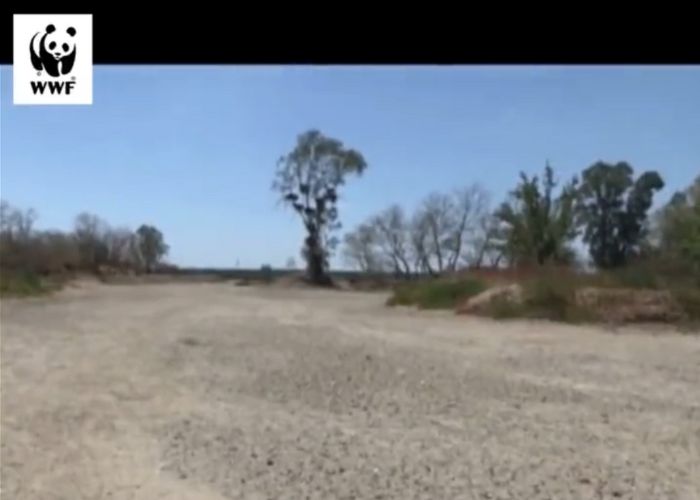MADRID – The battle between the Spanish government and the Partido Popular (PP) over the Doñana National Park continues. Furthermore, the conflict surrounding the PP’s proposal to legalise illegal farmland around the dried-out Doñana Park has now escalated to Brussels.
The PP government’s plan in Andalucia concerns the legalisation of farms growing red fruit in the Huelva region that is outside the designated irrigation area. These farms have used illegal wells to extract water. This in turn, has contributed to the depletion of the aquifer in the Doñana National Park area. Furthermore, this is one of Europe’s most important wetlands and is also a UNESCO World Heritage Site.
Related post: Andalucia signs death warrant for Spain’s most important wetland
Despite the lack of water, the illegal farms continue to provide employment and income to municipalities. That leads to debate over whether they should be legalised as irrigation farms. This would further strain already scarce water resources and exacerbate environmental problems caused by overexploitation of the aquifer.
Tensions within the European Commission
In Brussels, the subject leads to tensions within the European Commission. Spanish Prime Minister Pedro Sánchez and PP party leader Alberto Núñez Feijóo are the main characters in the battle. This includes issues such as water scarcity, the interests of strawberry growers, employment, rulings by European courts and upcoming municipal and regional elections.
Von der Leyen supports European Commissioner
Manfred Weber, president of the European People’s Party, accused the European Commissioner for the Environment of campaigning for Pedro Sánchez on Doñana. This prompted the President of the European Commission, Ursula von der Leyen, to defend the Commissioner’s policy. She supports Virginijus Sinkevicius amid criticism from the European People’s Party of his alleged support for Pedro Sánchez in the debate on the regularisation of irrigation in Doñana.
EC is the impartial guardian of EU treaties
In its own words, the Commission is fulfilling its role in managing compliance with the ruling of the Court of Justice of the EU to protect the wetland, the largest wetland in Europe. The spokesperson for the Commission and the spokesperson for the Environment both emphasised that the Commission is an impartial guardian of the EU treaties. To this end, they have had four meetings with the Spanish authorities on the Doñana case.
Political gain
The PP then conjured up heavy artillery to fight Sánchez’s alleged misuse of institutions. He would only bet on Doñana with political gain at stake. In doing so, the PP also refers to the fact that the current state of Doñana and the intensive agriculture around it were largely established during the decades that the PSOE governed the Andalucia region.
Dehydrated Doñana will be a source of CO2 emissions
Meanwhile, environmentalists are doing their best to highlight the importance of protecting Doñana. In El País, Enrique Moreno-Ostos, professor of ecology at the University of Malaga, argues that if Doñana dries out, the area will become a source of CO2 emissions. The professor has studied the link between greenhouse gas emissions and the desiccation of large bodies of water, such as the Aral Sea in Central Asia.
Related post: WWF: Twice as much illegal farmland in Doñana as estimated
Doñana as “Potential Disaster”
Moreno-Ostos is now studying the effects of wetland drying on carbon emissions. He warns that the destruction of wetlands could lead to a significant increase in CO2 emissions. He lists Doñana as a potential disaster because overexploitation of the aquifer could turn it into a source of emissions.
The professor criticizes the proposal of the parties PP and Vox in Andalucia to legalise the illegal irrigation around Doñana. He argues that this would only exacerbate the existing environmental problem.
Failed strawberry harvests
Meanwhile, what little water there is left is not enough for legal strawberry, raspberry and blueberry cultivation in the area. Let alone if the area of legally irrigable land is expanded. The image of failed harvests due to lack of water is becoming more and more common. Less rainfall this winter has further worsened the situation of depleted underground reserves.
Call to boycott red fruit from Huelvo
According to Freshplaza.es, the situation of farmers who do everything according to the rules is made even more difficult by calls for a boycott of strawberries from Huelva on social media. Those boycotts started after the approval of the Andalucian parliament of the proposal to regulate 1,900 hectares in the Doñana area. The boycott could affect the reputation of farmers who have nothing to do with the depletion of Doñana’s resources.
Related post: Conscious consumers want less and less Spanish strawberries
Additional threat from the tourist resort of Matalascañas
Epe.es highlights another water hazard in Doñana in the form of the tourist resort of Matalascañas. WWF also warned about this danger thirty years ago. The city’s water supply, which is overrun by tourists in summer, largely comes from the Doñana National Park. Complete with swimming pools, golf courses and numerous hotels, the town reaches a population of up to 300,000 in summer.
Matalascañas was originally built as a national tourist centre during Franco’s dictatorship. It was conceived as a new Benidorm or Torremolinos, with the idea of attracting international tourists to a luxury resort near a unique natural park. Wealthy families spent their holidays there and built villas and dug wells. Now dozens of luxury hotels and even more urbanisations are located just an hour’s drive from Seville.
The expansion of the Matalascañas wastewater treatment plant is delayed and is currently in an “alternative study” and is not expected to be completed until 2027. This is one of the most important projects to be completed to tackle the water shortage problem.
Related post: How Andalucian Benidorm is putting an end to wetland Doñana


